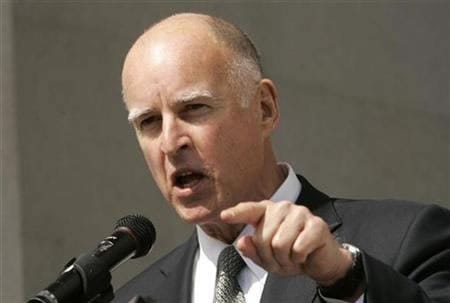Governor Brown condemns partisanship, then attacks Republicans


As polarized budget negotiations have become commonplace in Sacramento, Gov. Jerry Brown slammed Republicans for the fiscal crisis, comparing them to the Catholic church in his younger days as a seminarian.
"This budget reminds me of doctrines, from back when I was in seminary. If you're 15 minutes late to church, you could burn in hell. That's how Republicans are about taxes. There's a fanaticism. They are deeply stuck in a no-tax identity that is almost now, on the national level, a religion," he said.
Gov. Brown made his comments in a recent, exclusive interview with the Los Angeles Times. He continued to elaborate on the meme of them being the party of no taxes, utilizing even more negative imagery tied to the Catholic church.
"'No taxes is the central dogma in the new Republican church. You can't deviate. They won't burn you at the stake, but they'll recall you...nobody up here has the courage or cajones to do anything about it," he remarked.
Gov. Brown briefly rebuked fellow Democrats in the Times' published interview, but only minimally.
In light of the governor's condemnation of Sacramento's poisonous partisanship, it's fair to say that Brown embodies the very partisanship he claims to despise. Attempting to make his party appear as the good (or better) guys in a contest against Republicans, this isn't the first time that the governor has tried pinning them with the primary responsibility for the current budgetary mess. Adding to his partisan rhetoric, Gov. Brown previously posted a Youtube video, approximately a month ago, of himself signing what appears to be a veto of the California state budget, and then going on to blame his Republican counterparts for an unbalanced approach.
"For a decade, the can has been kicked down the road and death has piled up. In January, I presented a balanced budget solution of deep spending cuts and a proposal to let the people of California vote on whether to extend some taxes on a temporary basis. Unfortunately, the Republicans said no. They didn't want the people of California to have that right to vote," he said on the matter.
With the viral nature of online tools like Youtube, it's easy to see how Gov. Brown's video can rapidly propagate the usual partisan blame game that has come to define Sacramento politics. It's perhaps not all together ironic that he would tell the Los Angeles Times that the debt ceiling debate in Washington was a "very dangerous and sorry spectacle" that reflects a broken political system.
While he may offer the correct assessment, Gov. Brown must also recognize that his own inflammatory rhetoric is counterproductive to reaching an ultimate fiscal solution. What's happening in both Sacramento and DC is even further evidence of the need for a fresh set of independently-minded candidates to enter the political arena, ones that care about transcending party affiliation and presenting common sense solutions for the common good.



